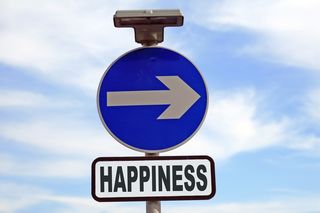
Happiness
Happiness Tool 2: Cultivate Enlightened Tolerance
The path to daily happiness, fulfillment, and satisfaction.
Posted July 5, 2017

I asserted in my last blog that the purpose of life is to be happy. I am not alone in concluding this. Such giants as Aristotle, the Dalai Lama, and the genius American psychologist, Dr. Albert Ellis, have all so said.
But I also asserted that achieving and sustaining happiness is difficult. Why? Because there are at least two mighty forces that regularly challenge us. One, we do not live in the best of all possible worlds. It is one that presents us with a steady stream of annoyances, frustrations, and adversity, most often minor, but sometimes major. All you have to do is look around to see that this is true. A second is that we do not live among saints or angels. To the contrary, we are surrounded by fallible, flawed human beings, people who will, at times, behave in insensitive, rude, and, yes, even cruel ways. That's certainly my experience. Isn’t it yours as well?
Fortunately, there is good news. It is that these inevitable hardships and hassles do not, in and of themselves, have the power to wreck our happiness. We are not mere stimulus-response machines that have no choice but to react with unhappiness when facing hardships. Rather, what determines how we react is the way we think about these hardships, how we evaluate them, the judgments we make of them.
Now validated through thousands of experimental studies, we communicate this fact about human nature by using a very simple ABC model (See Figure 1).
Figure 1
The ABC’s of Happiness and Unhappiness
Activating Event Belief Emotional Consequence
A -------- activates --------> B -------- causes ----------> C
Hardship/Hassle Judgment Response
In this ABC model, the Activating Event of some hardship or hassle (at A) does not directly cause one’s emotional reaction (at C). Rather, it is the way we evaluate it (at B) that determines whether or not we experience happiness or unhappiness. This explains how two people facing the same adversity can react in such radically different ways to the same undesirable event — one with irrational thinking that creates anger, self-pity, and despair, the other with rational thinking that prompts frustration, but which keeps the door open for pleasure and happiness.
There is further good news about this ABC model. It is that, with hard work and practice, we can train ourselves to think in logical, rational ways when facing adversity so as not to bring upon ourselves unhappiness and misery. This is the power we all hold, if only we are wise enough to work to train ourselves to do so.
This brings me to the choice we have between two beliefs, two ways of approaching the world, one of which I call Enlightened Tolerance, the other Childish Intolerance. When facing an adversity at A — small or large, short term or enduring, fair or unfair — the choice one makes at B between these two perspectives will largely determine our happiness quotient at C.
The Case of Jamie
When I think of someone who suffers the results of Childish Intolerance, I think of Jamie. A 52-year-old massage therapist, married and with two teenage children, he explained the one-word complaint he wrote on his intake sheet, “Unhappy,” by telling me he characteristically responded to adversity with frequent irritation, stress, and despondency, punctuated by periodically angry outbursts. He concluded with the sad comment, “I no longer find any spark in life.”
Try as I might, I could not uncover any but the same types of mundane life annoyances in his life that most of us experience — traffic congestion, the moodiness of his teenagers, and the like. What he did reveal, though, was a whiny, poor-me habituated way of thinking whenever he faced a frustration or hassle, to whit:
1. This sucks.
2. It's horrible to have to deal with all this crap. It's too much.
3. What's the point of life if I have to put up with all of this? I shouldn't have to.
4. Poor me.
At first Jamie resisted taking responsibility for his emotional reactions, wanting to blame the circumstances in his life for causing it. But, with persistence, I finally succeeded in getting him to see that the cause of his disgruntlement (at C) was not the frustrations that visited his life (at A), but his childish way of thinking (at B). Once he accepted responsibility for causing his own misery, he and I went to work to convince him how illogical and self-defeating was his thinking, thereby enabling him to give them up. He came to adopt the following Enlightened Tolerance perspectives:
1. Yes, this particular adversity (A) does indeed suck. Nobody in their right mind would like it, so why should I?
2. But, no, it neither rises to the level of a horror or as something too much for me to bear. On a scale from one to one hundred, with one hundred representing the worst that could ever befall me, this event only stretches into single digits of badness. It's an annoyance or a hassle that I don't like; but one I can easily bear.
3. I'm not a special case in the universe such that I should be spared hardships and hassles. Where do I get off thinking I shouldn’t have to run into these bumps in my life? Furthermore, this one sucky thing hardly represents the whole of my life. It contains so many good things, with just a few frustrations, like this one, thrown in here and there.
4. Quit whining and either work to get rid of the annoyance or just lump it while working to find pleasures elsewhere.
So, through the process of Jamie's psychotherapy, he succeeded in re-educating himself to think with Enlightened Tolerance. He realized that: (1) there is no universal law that prohibits adversity from existing, nor am I a special being who should not face the same negative events as everyone else; (2) when I encounter some difficulty, it is merely an annoyance that hardly amounts to something unbearable atrocity or a horror; and (3) though I dislike dealing with this annoyance, there's much more to life than this, most of which I can and will enjoy, if I try.
With this new way of thinking, Jamie put himself in the position of having the best of two worlds: one, he could acknowledge the existence of an adversity when it arose, dislike it, and work to rid it if he so choose; at the same time, if he was not able to immediately rid it, he could gracefully tolerate it well while enjoying the rest of his life. If Jamie could learn to think this way, there's no reason why you couldn't as well.
Going Forward
It is the wise person who takes one's mental perspective serious, for it determines whether one exists in a happy or unhappy mood — momentarily and overtime. Cultivating Enlightened Tolerance helps a person to gracefully lump what one doesn't like and to change what one can, all the while going about the business of pursuing personal happiness.
Until my next blog, live with happiness and passion.
Russell Grieger, Ph.D. is a licensed clinical psychologist in private practice in Charlottesville, Virginia. The author of several self-help books, all designed to empower people to create a life they love to live, he invites you to check out his new relationship happiness book, The Couples Therapy Companion; A Cognitive Behavior Workbook and his new motivation book, Developing Unrelenting Drive, Dedication, and Determination. Both can be found on Amazon. You may contact Dr. Grieger for questions or for more information at grieger@cstone.net



